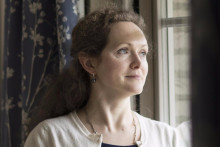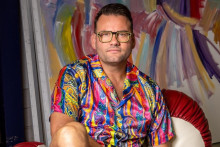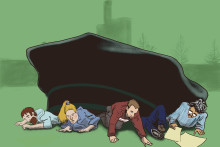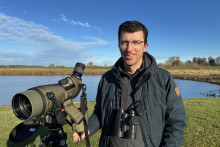Tatiana Filatova, currently an adjunct professor of 'Economic Modelling for Resilient Societies' at CSTM, is certainly driven and inspiring. The motivation to succeed comes almost naturally to her. ‘I come from a rather unconventional family,’ she begins her story. ‘My parents were both the first in their families to get a university degree and they both accomplished so much. My mother was the head of a big engineering unit by the age of 28 and my father was the chief engineer in the region and received many honors, including a presidential one. They were big role models for me and they are still my best friends.’
‘Understand your goals'
‘The norm in our family was to finish school and go to a university. I didn’t even know there were other options until I was a teenager,’ laughs the professor, who was born and raised in the far east of Russia, in a city called Chita, located closer to China than Europe. ‘The message my parents always gave me was that if you want something, you can get it. You only need to understand your goals and put effort into reaching them.’ This advice is something that Tatiana Filatova has carried with her since childhood, although, she admits, it wasn’t always easy to set her goals. She definitely didn’t always know she wanted to be a scientist.
‘When I was a little girl, I thought I would become an interpreter, because then I could speak foreign languages and travel a lot – which is actually what I do now, just in a very different role,’ smiles Filatova, for whom the big ‘game changer’ came during her Master’s studies at a technical university in Chita. ‘There was a great professor of economics, Irina Glazyrina. She was an outstanding academic and I wanted to work with her. I ended up doing an internship in her NGO focused on ecological economics research. This opened a whole new world for me. It introduced me to global environmental issues and gave me a direction which had a meaning.’
An unconventional choice
It was also Irina Glazyrina who suggested that Tatiana Filatova should pursue PhD research. ‘Coming from an engineering family, this was a very unconventional idea. At first I rejected it, but soon I became convinced that I wanted to get PhD in environmental issues, using economic models and also programming,’ says Filatova. From that point onward, she’s had her eyes set on the prize.

After visiting the University of Twente during her work for the Russian Academy of Sciences, Tatiana Filatova knew that the Netherlands was the perfect place for her PhD research and she actively searched for open positions. And she found one at the UT. Here she began her PhD research on how cities exposed to floods can become more resilient at the macro level due to behavioral changes of individuals. Filatova learned a new rapidly growing method: agent-based modelling, which is a computerized simulation of many decision-makers interacting according to rules. Thus, one can create an artificial society and study how individual choices of ordinary persons or companies can result in big changes on a societal scale.
USA versus the Netherlands
Tatiana Filatova did part of her PhD research in USA, where she also met her husband. ‘I thought I would just move to the U.S., I even moved all my things there and had a job offer, but I also had my doubts. The lifestyle there is very different. The quality of life is much better in the Netherlands, here you have the freedom to choose your own work-life balance, which opens many ways to combine a demanding career with children– and I always knew I wanted children,’ says the mother of two young boys. ‘It was a difficult decision, but when my husband got a job at ITC, I chose to come back to Twente.’
After getting a PhD degree, it was natural for her to work towards becoming a professor, says Filatova: ‘I didn’t even think of other options and I started a tenure track here. As a first step, I submitted a VENI proposal.’ It was at this moment, when a seemingly promising academic career reached a critical point. The VENI proposal didn’t get accepted. ‘Everyone who’s had their grant proposals rejected, knows the pain. You invest much more than your time, you invest yourself and your emotions. After the rejection, I was ready to quit.’
‘Thankfully, my supervisor called me and explained that there is “day and night” of science and that I need to have the strength to go through the dark moments. This was the first time I saw this side of academia. I realized that I had to gather my energy and go on. I was lucky to have wise mentors who taught me that people who give up too early won’t succeed. I also got motivation from my family, who’d always said “know what you want and never stop”. And it was worth it. I wouldn’t be happy without this job.’
Tatiana Filatova in a nutshell:
2016: Adjunct Professor of 'Economic Modelling for Resilient Societies' at CSTM
2015: Member of De Jonge Akademie (KNAW - Royal Dutch Academy of Sciences)
2009- 2015: Economist at Deltares, Dutch knowledge institute in the field of water management
2014: Early Career Excellence Award, International Environmental Modelling and Software Society
2013: Professor De Winter Prize
2012: VENI grant
2009: PhD (Cum Laude), Department of Water Engineering and Management, University of Twente
2003: MSc (Cum Laude), Information systems in economics, Chita State Technical University, Russia
Current research
The decision to stay in academia was indeed worth it. Being persistent, Tatiana Filatova received the VENI grant for project ‘Changing climate – changing behavior: integrating adaptive economic behavior in land-use models’. Within this project she integrated urban economics into spatial agent-based models and studied climate-induced risks in hurricane-prone coastal cities in USA. She initiated a new thread in the academic literature on modeling agent-based land markets including behavioral biases such as risk perceptions.
Now, Tatiana Filatova is only one step away from becoming a full professor and she is continuing her research related to economics of climate change. ‘I want to contribute to dealing with global environmental problems,’ she says. ‘For example, in my team we focus on what people could do to decrease energy footprint or how they behave then facing disaster risk. Given this global focus, I am very proud of my PhD students who actively work within international networks worldwide. We use economic theories and psychology to see how people behave and we program their behavior into artificial agents to see what it leads to. It serves as a computerized laboratory to explore different policies.’

Stimulating or wasted time
Besides research, Tatiana Filatova is also passionate about improving academic policies. At BMS she is involved in the faculty’s research renewal think tank. Nationally, as a member of the Young Academy (DJA/KNAW) and the co-chair of the Science Policy Trace, she wants to improve the situation of PhD researchers coming to the Netherlands on foreign fellowships and she wants to contribute to changing the grant writing system. ‘Preparing a grant proposal can be extremely stimulating, but it can also be wasted time, because the success rates are constantly dropping. A lot of researchers’ time is spent on writing grant proposals instead on improving teaching or actually performing research,’ thinks Filatova. ‘I hope I can make an impact and minimize the struggles that especially young scientists have to go through.’
This story was also published in our latest Science Magazine.







